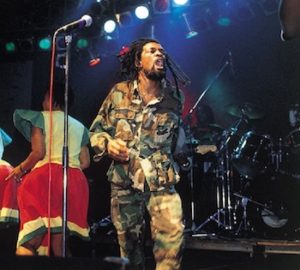
Lucky Dube
*Lucky Dube was born on this date in 1964. He was a Black South African reggae musician.
Lucky Philip Dube was born in Ermelo, then in the Eastern Transvaal, now Mpumalanga, South Africa. His parents separated before his birth, and he was raised by his mother, Sarah. She named him Lucky because she considered his birth fortunate after several failed pregnancies. Along with his two siblings, Thandi and Patrick, Dube spent much of his childhood with his grandmother while his mother relocated to work.
Dube worked as a gardener, but realizing he wasn't earning enough to feed his family, he began attending school. There, he joined a choir and, with some friends, formed his first musical ensemble, The Skyway Band. While at school, he discovered the Rastafari movement. At 18, Dube joined his cousin's band, The Love Brothers, playing Zulu pop music known as mbaqanga. The band signed with Teal Record Company (Teal was later incorporated into Gallo Record Company). While Dube was still attending classes, the band recorded material in Johannesburg during school breaks.
Their debut album was released under the name Lucky Dube and the Supersoul. On the second album, Dube wrote some of the lyrics, sang, and also began to learn English. After his fifth Mbaqanga album, he dropped the "Supersoul" name. At this time, Dube’s fans were responding to some reggae songs he played during live concerts. Inspired by Jimmy Cliff and Peter Tosh, he felt the socio-political messages associated with Jamaican reggae were related to South Africans in an institutionally racist society. In 1984, he released a new musical direction with the mini-album Rastas Never Die. The record sold poorly. Keen to suppress anti-apartheid activism, the apartheid regime banned the album in 1985.
Not discouraged, he continued to perform the reggae tracks live and wrote and produced a second reggae album. Think About The Children (1985). It went platinum and established Dube as a popular reggae artist in South Africa, while also attracting global attention. Dube continued to release commercially successful albums. In 1989, he won four OKTV Awards for Prisoner, another for Captured Live in 1990, and another two for House Of Exile in 1991. His 1993 album Victims sold over one million copies worldwide. In 1995, he earned a worldwide recording contract with Motown. His album Trinity was the first release on Tabu Records after Motown acquired the label.
In 1996, he released a compilation album, Serious Reggae Business. This led to him being named the "Best Selling African Recording Artist" at the World Music Awards and the "International Artist of the Year" at the Ghana Music Awards. His next three albums each won the South African Music Awards. His album Respect earned a European release, and Dube toured internationally, sharing stages with Sinéad O'Connor, Peter Gabriel, and Sting. He appeared at the 1991 Reggae Sunsplash and the 2005 Live 8 event in Johannesburg.
In addition to music, Dube acted, appearing in the feature films Voice In The Dark, Getting Lucky, and Lucky Strikes Back. On October 18, 2007, Dube was killed in the Johannesburg suburb of Rosettenville shortly after dropping two of his seven children off at their uncle’s house. Police reports suggest carjackers killed him.
Lucky Dube recorded 22 albums in Zulu, English, and Afrikaans in 25 years and was one of South Africa's biggest-selling reggae artists. He is survived by his wife, Zanele, and seven children.